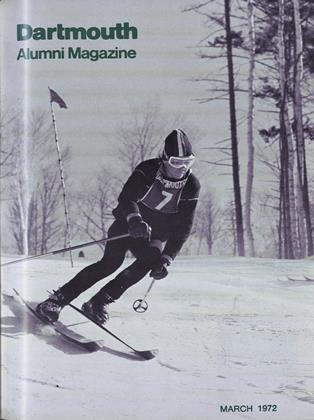Second Edition. By NelsonManfred Blake '30. New York: McGrawHill Book Company, 1972. 764 pp.Illustrated. $10.95.
A second edition of any book implies that the first was sufficiently well received to warrant revision to keep it timely. As the sports' announcer said, "It couldn't have happened to a nicer guy." Professor Nelson Blake has long been recognized as one of our abler and more industrious historians. Obviously, he has been collecting and sifting the present material diligently for many years.
Professor Blake has provided us with the best existing survey of American social history. Naturally, he must include a certain number of political, intellectual, and philosophic concepts, but his chief effort is to describe such developments as those in economics, science, education, art, literature, city growth, and racial relations. If there is any particular social emphasis, it is on economic development, but this does not overwhelm other topics. The organization is excellent and the writing first rate, with considerable effort made to give the reader adequate factual material but not burden him with too numerous names and dates. Of course, this book is not the kind one resorts to for whiling away a hot summer evening, but any thoughtful reader will find the contents informative and attractive.
Much has happened since the first edition appeared in 1963, and hence the new volume is something like a hundred pages longer than its predecessor. Actually, most of the book closely follows the first edition in organization and content. In a couple of instances, chapters are combined differently. The pictures are changed a trifle, some being enlarged, and others decreased in size. Here and there the text has been modified somewhat to give greater attention to the Negro.
The last eight chapters are changed considerably to include recent events ranging from Martin Luther King and Black Activism to campus troubles, the New Morality, and space exploration. The most extensive treatment focuses on the Negro and campus activities. There also appears at the end of the book a list of carefully selected readings designed for those who would like to know more of any of the book's topics.
In summary, this book is excellent in every way, and will be greeted with enthusiasm by anyone interested in a good social history of the United States.
Author and co-author of ten volumesdevoted to the American scene past andpresent, among which are American Feminists (1963 and 1968), American Women (1970), and America Moves West (1971),Mr. Riegel is Dartmouth Professor ofHistory, Emeritus.
 View Full Issue
View Full Issue
More From This Issue
-
 Feature
FeatureFinancing Higher Education
March 1972 By John G. Kemeny -
 Feature
Feature"Fraternities Are in Trouble"
March 1972 By DAVID WRIGHT '72 -
 Feature
FeaturePilobolus: Energetic Dance-Theater
March 1972 By ANDREW W. CASSEL '72 -
 Feature
FeatureDartmouth Institute Plans First Session
March 1972 By M.R. -
 Article
ArticleFaculty
March 1972 By ROBERT B. GRAHAM '40 -
 Class Notes
Class Notes1950
March 1972 By JACQUES HARLOW, ERIC T. MILLER
ROBERT E. RIEGEL
-
 Article
ArticleTHE DAY OF THE CATTLEMAN
MARCH 1930 By Robert E. Riegel -
 Books
BooksJoseph Hawley, Colonial Radical
DECEMBER 1931 By Robert E. Riegel -
 Article
ArticleThe New Social Science Program
January 1937 By ROBERT E. RIEGEL -
 Books
BooksTHE DECLINE OF AMERICAN LIBERAL-
April 1956 By ROBERT E. RIEGEL -
 Books
BooksAMERICAN HISTORY.
December 1961 By ROBERT E. RIEGEL -
 Books
BooksARTISTS OF THE OLD WEST.
JANUARY 1968 By ROBERT E. RIEGEL








